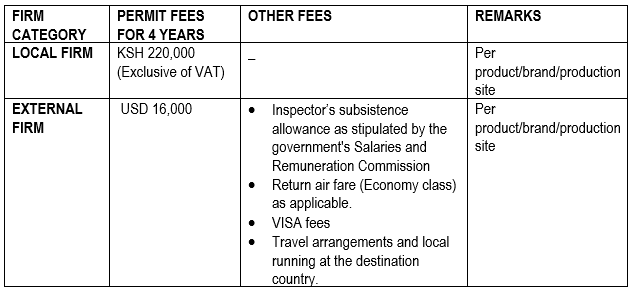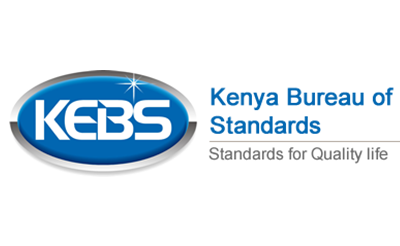
Standardization Mark
This is a mandatory product certification scheme for locally manufactured products provided for under section 10 of the Standards Act Cap 496, Laws of Kenya. To acquire the mark, manufactured goods are expected to meet quality requirements as specified in the various Kenya/Approved Standards. A permit to use a Standardization Mark is issued to a firm to certify that a particular product conforms to requirements in a Standard.
- Related Links
- Steps To Acquire Standardization Mark Permit
PRODUCT CERTIFICATION PROCESS
Step 1: Application process
- Access the KIMS portal through the link https://kims.kebs.organd sign up. Follow the application procedure as guided by the platform (KIMS Manufacturer User Manual – Quality Assurance).
- Provide the documentations as required.
- Pay the required product certification fees as appropriate
- Acquire the Product Standards (specification and sector codes of practices)
- Please note that no product samples are required at the time of submitting your application.
Step 2: Assessment process
KEBS quality assurance officers will pay a visit to your production facility to;
- Carry out industrial inspection
- Draw samples for analysis
- Discuss and agree on scheme of supervision and control
Step 3 Evaluation
- Samples are analyzed at KEBS laboratories or other accredited/Designated laboratories to check compliance With Kenya standards or approved specification. If samples comply and inspection officer’s report indicate compliance with codes of practice a recommendation is made to the Permit Standardization committee (PSC) for issuance of permit.
- If PSC confirms that all requirements have been met, a permit is issued. The manufacturer shall display the standardization mark logo and the permit number on the product label.
- If samples fail to comply in the first instance and corrective action reviewed for appropriateness retesting of parameter not complied with is done free of charge and if product comply permit to use standardization mark is issued.
- If samples fail to comply in the second instance and subsequent tests, testing will be carried at the expense of the manufacturer.
- If nonconformities are identified at the point of Inspection, the Manufacturer has the responsibility to undertake corrective action and inform KEBS to confirm the actions taken.
NOTES:
- Large Manufacturing Enterprises (LME) – Turnover over Kshs.500, 000 per Annum and or a group operating under a central point e.g. NGOs whose quality control activities can be traced to the central body to pay per applicant or group.
- Medium Manufacturing Enterprises (MME) -Turnover over between Kshs.200, 000 and Kshs. 500,000 per annum
- Small Manufacturing Enterprises (SME) -Turnover over below Kshs.200, 000 per annum
- Alcoholic beverage manufacturers/dealer, Animal feed millers, Fortified maize /wheat millers, Milk pasteurizer’s bottlers, Containerized drinking water and all fall under LME firm category.
- All the payment for standardization mark application shall be made at the time of application.
- For any change request on permit the client shall pay Ksh.1000 upon evaluation and change granted
CERTIFICATION FEES SCHEDULE
- Standardization Mark (S-Mark) Fee Schedule
FEES SCHEDULE FOR STANDARDIZATION MARK (FOR TWO YEARS) EXCLUSIVE OF VAT

- ASSESSMENT CRITERIA
- Evidence of quality control on;
- Incoming raw material
- In process controls
- Finished products
- Product labelling
- Handling of complaints
- Plant house keeping
- Environmental consideration
Notes
Alcoholic beverage manufacturers/dealer, Animal feed millers, Fortified maize /wheat millers, Milk pasteurizer’s bottlers, Containerized drinking water and all fall under fall under LME firm category.

Diamond Mark of Quality
- Related Links
- Steps To Acquire Diamond Mark Permit
Step 1: Application process
- Have 3 complying test samples reports in last 9 months for new grants or 3 complying test samples distributed proportionately within validity period for renewal
- Dully fill in duplicate the Diamond mark application form (STA 1)
- Dully fill in initial factory assessment form (STA 10) (New applicants)
- Dully fill in assessment form ( STA 3) (Diamond Mark applicants)
- Dully fill in duplicate the standards levy notification form( SL1)
- Provide us with a copy of company registration form, CR12 for Ltd Companies, evidences for registration for CBOS, Cooperatives societies, self-help groups etc.
- Pay the required product certification fees as appropriate
- Acquire Product Standards (specification and sector codes of practices)
Please note that no product samples are required at the time of submitting your application.
You can obtain STA1, STA 3, STA 10, and SL1 forms at the nearest KEBS office or download from KEBS website www.kebs.org
Step 2: Evaluation/Assessment process
KEBS quality assurance officers (Assessors) will pay a visit to your production facility to verify;
- Evidence of quality control on; Incoming raw material, In-process controls and finished products
- Product labelling
- Quality Records
- Calibration of equipment
- Handling of complaints
- Plant house keeping
- Environmental consideration
The assessors may draw samples for further testing and discuss and agree on scheme of supervision and control
If nonconformities are identified at the end of Assessment/Inspection, the Manufacturer has the responsibility to undertake corrective action and inform KEBS to confirm the actions taken.
Step 3 Review and Decision making
- Assessors write recommendation for review by Regional Manager or Head of Department
- Regional Manager or Head of Department presents recommendation to Permit Approval Committee (PAC) for approval
- PAC confirms that all requirements have been met, a permit is issued.
CERTIFICATION FEES SCHEDULE
FEES SCHEDULE FOR DIAMOND MARK (FOR FOUR YEARS)

NOTES
- Large Manufacturing Enterprises (LME) – Turnover over Kshs.500, 000 per Annum and or a group operating under a central point e.g. NGOs whose quality control activities can be traced to the central body to pay per applicant or group.
- Medium Manufacturing Enterprises (MME) -Turnover over between Kshs.200, 000 and Kshs. 500,000 per annum
- Small Manufacturing Enterprises (SME) -Turnover over below Kshs.200, 000 per annum
- Alcoholic beverage manufacturers/dealer, Animal feed millers, Fortified maize /wheat millers, Milk pasteurizer’s bottlers, Containerized drinking water and all fall under LME firm category.

Import Standardization Mark of Quality
The first phase of the project targets ALL imported products intended for sale in the local market. All importers of the aforementioned goods will be required to purchase Import Standardization Mark (ISM) stickers directly from KEBS. Importers will be required to apply for ISM by submitting Copies of Certificate of Conformity, Import Declaration Form and Customs Entry to KEBS.
- Related Links

Calibration mark
To acquire a calibration mark, the equipment must be calibrated at KEBS metrology laboratories and must perform within acceptable margins. This mark therefore gives confidence that the equipment measurements are reliable, accurate as per the performance specifications and traceable to the international system of units (SI). It is strongly recommended that you look at the calibration certificate issued for complete equipment performance characteristics. For steps on how to have your equipment calibrated at KEBS, kindly look our FAQ (FAQ – Kenya Bureau of Standards (kebs.org)) or contact KEBS Metrology Department on info.metrology@kebs.org.
- Image


Fortification Mark of Quality
The Ministry of Public Health and Sanitation through a Legal Notice no. 62 of 15th June 2012 has therefore declared it mandatory to fortify the following food products;
Wheat Flour – with Zinc ,Iron and Vitamin A
Dry Milled Maize Products- with Zinc ,Iron and Vitamin A
Vegetable Fats and Oils- with Vitamin A
Ministry of Health has subsequently signed an Memorandum of Understanding (MOU) with KEBS to administer the Food Fortification Logo and certification of products which fulfil the requirements of the relevant Kenya Standard with respect to Fortification. An applicant for the food fortification logo must have a valid Standardization Mark or Diamond Mark for the food vehicle.
Any manufacturer applying for Fortification logo must have acquired the S-Mark in accordance with KEBS procedures. The price of acquiring this mark is Kes. 20,000 per product per brand per site for 2 years exclusive of VAT.
- Related Links
- Steps To Acquire Fortification Mark Permit
FOOD FORTIFICATION APPLICATION PROCESS
Step 1: Application process
The client shall apply for the grant Food fortification mark at the time of application of standardization mark.
Access the KIMS portal through the link: https://kims.kebs.org and sign up. Follow the application procedure as guided by the platform (KIMS Manufacturer Manual).
Step 2: Assessment process
KEBS quality assurance officers will pay a visit to your production facility to;
- Carry out industrial inspection
- Draw samples for analysis
- Discuss and agree on scheme of supervision and control
Step 3 Evaluation
- Samples are analyzed at KEBS laboratories or other accredited/Designated laboratories to check compliance
- With Kenya standards or approved specification.
- If samples comply and inspection officer’s report indicate compliance with codes of practice a recommendation is made for issuance of permit to use food fortification mark to the Permit Standardization committee (PSC) for standardization Mark.
- If PSC confirms that all requirements have been met, a permit is issued.
- If samples fail to comply in the first instance and corrective action reviewed for appropriateness retesting of parameter not complied with is done free of charge and if product comply permit to use standardization mark is issued
- If samples fail to comply in the second instance and subsequent tests, testing will be carried at the expense of the manufacturer.
- If nonconformities are identified at the point of Inspection, the Manufacturer has the responsibility to undertake corrective action and inform KEBS to confirm the actions taken.
CERTIFICATION FEES SCHEDULE
FEES SCHEDULE FOR FOOD FORTIFICATION LOGO (FOR TWO YEARS) EXCLUSIVE OF VAT

- Any manufacturer applying for Fortification logo must have acquired the S-Mark/ D-Mark in accordance with KEBS procedures.
NOTE:
- All the payment for standardization mark application shall be made at the time of application.
ASSESSMENT CRITERIA
- Evidence of quality control on;
- Incoming raw material
- In process controls
- Finished products
- Product labelling
- Handling of complaints
- Plant house keeping
- Environmental consideration
Notes
Alcoholic beverage manufacturers/dealer, Animal feed millers, Fortified maize /wheat millers, Milk pasteurizer’s bottlers, Containerized drinking water and all fall under category 2(i) and 2(iv)above.
